 Trump holds an example of what a new tax form may look like during a meeting on tax policy with Republican lawmakers in November.Evan Vucci/AP
Trump holds an example of what a new tax form may look like during a meeting on tax policy with Republican lawmakers in November.Evan Vucci/AP
- There’s a lot of anticipation for big-ticket pharmaceutical mergers and acquisitions to take off in 2018.
- That’s in large part because of the tax reform that passed in 2017, which frees up cash companies have overseas and lowers the corporate tax rate.
- “We’d love to use the cash to buy and partner to expand our pipeline,” Eli Lilly chief financial officer Josh Smiley told Business Insider.
- The first two weeks of 2018 have been slower that some might have expected, but one analyst expects there’s much more to come.
- “There’s a potential for another round of change within the pharmaceutical sector, given there’s this much money overseas and that’s got a chance to be repatriated,” GlaxoSmithKline US pharmaceuticals president Jack Bailey told Business Insider.
Every year, the biggest names in the pharma industry head to San Francisco to the JPMorgan Healthcare Conference. And almost every year, a couple of big industry deals get announced at the event.
This year, the expectation of M&A was especially pronounced. That’s in large part because of tax reform in the US, which in addition to offering companies based in the US a lower corporate tax rate allows them to repatriate some of the cash they have overseas and put it to use. The life sciences is one of the industries with the most cash overseas that’d be eligible for repatriation.
“There was a big, big expectation that there was going to be some big M&A announced,” UBS senior healthcare analyst Jerome Brimeyer told Business Insider.
On Sunday, biotech giant Celgene acquired Impact Biosciences in a $7 billion deal. And the Danish pharmaceutical company Novo Nordisk made a $3.1 billion bid for the biotech company Ablynx, which was rejected. Based on the conversations Brimeyer’s heard in San Francisco this week, the deals announced this year far have been underwhelming. “There was almost a disappointment that there wasn’t more M&A,” Brimeyer said.
That disappointment won’t last forever, he said. “I think given tax reform, there’s much more to come. I think that’s going to be an important factor for the performance of biotech and pharma this year. “
Cash waiting to be used
It’s something that’s on company’s radars, Brimeyer said, especially as they think of ways to use that repatriated cash. Other options besides acquiring companies with new medications in the works include share repurchasing programs, increasing dividends, and in some cases paying down debt.
Eli Lilly chief financial officer Josh Smiley told Business Insider that the company has about $9 billion in cash overseas that will be repatriated over the next few years. While an estimated $3.5 billion will be paid in taxes to the US, the remaining money will ideally be used to build up the treatments Lilly has in the works.
“We’d love to use the cash to buy and partner to expand our pipeline,” Smiley said. Ultimately, the hope is to have one-third of Lilly’s pipeline of medicines that are in development coming from outside the company.
But the changes that tax reform brings doesn’t necessarily mean there’s going to be an across-the-board flood of new deals, since some major pharmaceutical companies aren’t based in the US to begin with.
“You can’t just say ‘OK, it’s going to trigger M&A in pharma,’ I think it’s going to be very company specific,” GlaxoSmithKline US pharmaceuticals president Jack Bailey told Business Insider. The cash could also be used for other purposes, such as internal investments and dividends, he said.
“What we do know is there’s a potential for another round of change within the pharmaceutical sector, given there’s this much money overseas and that’s got a chance to be repatriated,” Bailey said. “So I think it’s going to be fascinating to watch, much like the pricing and reimbursement, legislative actions, and regulatory actions.”













